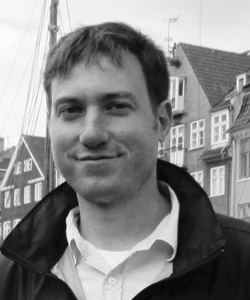One weekend, while not paying attention as I was playing a game of football, I collided with a friend. My hand puffed up immediately, and a visit to the doctor confirmed what I felt: It was broken.
I was working as a field cable technician. With a broken hand, there would be no climbing telephone poles, no lifting cable reels, and no hammer-drilling. My boss helped me activate short-term disability and gave me instructions to keep him updated as I healed.
It was a pensive drive home from work. What now? Since leaving high school, I had always worked with my hands, first as a Marine, later as a home renovator, and finally as a cable tech. Yet over the last few years, I found myself reading more and more. I filled my nights and weekends reading, especially about the Middle East. I was just a kid when I was deployed to Iraq in 2005. But I wanted to learn as much as possible about the history of the region, as well as the implications of prolonged war and of the likelihood that the U.S. would maintain a military presence.
I knew I wanted to go to college, particularly to study political science, and I felt the opportunity wouldn’t manifest itself unless I enrolled in school full time. I wanted to be in an environment where discussion of big ideas would be valued and encouraged. But I was hesitant, and my hesitation around applying to college was continually amplified by an inner voice that said you might not be good enough.
I grew up in a blue-collar family. My dad painted houses for a living, and as a kid, I spent summers carrying his ladders, cleaning paintbrushes, and filling pails with paint and stain. The greatest lessons of my childhood were not academic in nature but focused instead on how to work quickly and efficiently, to do the job well—I was always taught that your work quality is a representation of yourself—and move on to the next. The thought of becoming a full- time student was attractive, but it would require a kind of work I was unaccustomed to.
So, it became a matter of wondering whether or not I belonged in college, whether or not I could contribute something. I had been out of school a long time and had no point of reference for what to expect: I would be the first in my family attempting to attain a bachelor’s degree.
The questions and excuses I gave myself, at points, became paralyzing: If it doesn’t work out, will you be able to find another job in your field? You’ll be almost a decade older than the rest of your classmates; nobody will be able to relate. You’ve never prioritized academics previously, so what makes you think that things will be different now?
My hand was healing slowly. In keeping with my boss’ instructions, I kept him updated. One afternoon I called him, and he told me that he might have to post my position, as it had been quite some time and the doctor wouldn’t release me to return to work. Immediately, I responded: “It’s okay, I’m not coming back. I’m going back to school.” The words leapt from my mouth. I hadn’t even started applying to any colleges, but I knew it was the right thing to do.
In retrospect, I realized that the fear I felt was replaced by a fear of regret, of looking back and saying I didn’t take that chance. I came to realize that I had accomplished a lot. I knew that in classroom discussions, I would bring the insights of a former Marine who had lived through the consequences of foreign policy.
That one sentence—“I’m going back to school”— changed my life.
Nervousness defined my initial few weeks at Duke. I had read about imposter syndrome, and each day in class I expected would be the one when I would be outed as a fraud. It was my first foray in the everyday world of an elite university, after all, and I wasn’t quite sure if I had what it took to truly succeed at that level. I was quiet during discussions, but eventually—because the professor called on me—I had to say something. When I jumped into the conversation, I felt a sense of relief: This was what I had been looking for, the opportunity to combine my perspective, my life, with academic study.
My hard work had brought me to the right place.
Bonin A.M. ’14 is an economics and history instructor, an education consultant, and a veteran of the Iraq War. He has contributed to publications such as The Atlantic and The Wall Street Journal.

Share your comments
Have an account?
Sign in to commentNo Account?
Email the editor